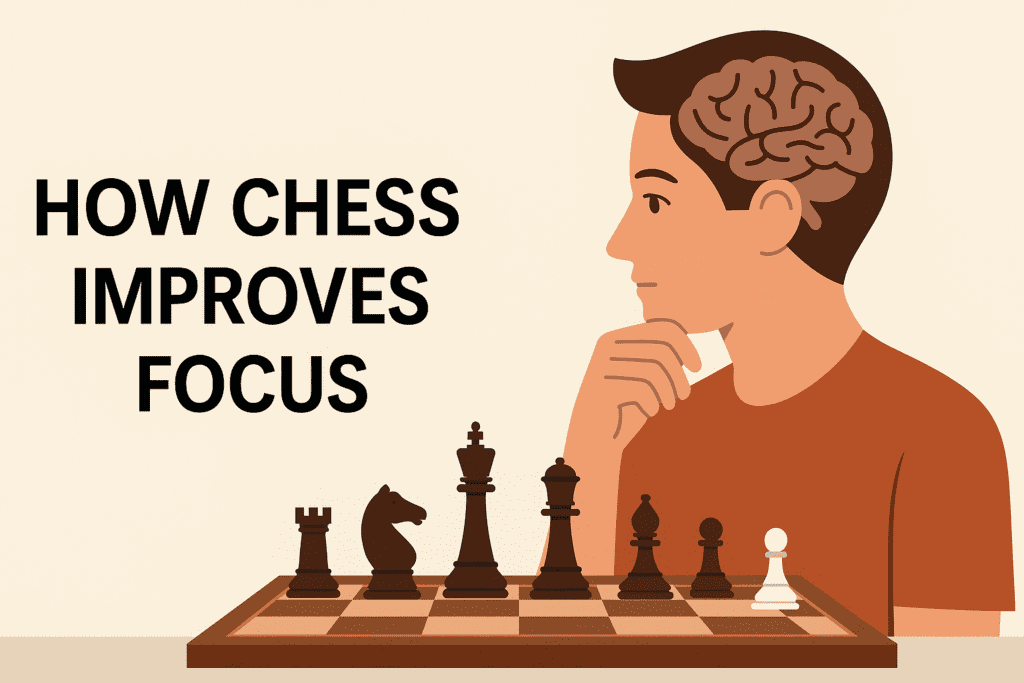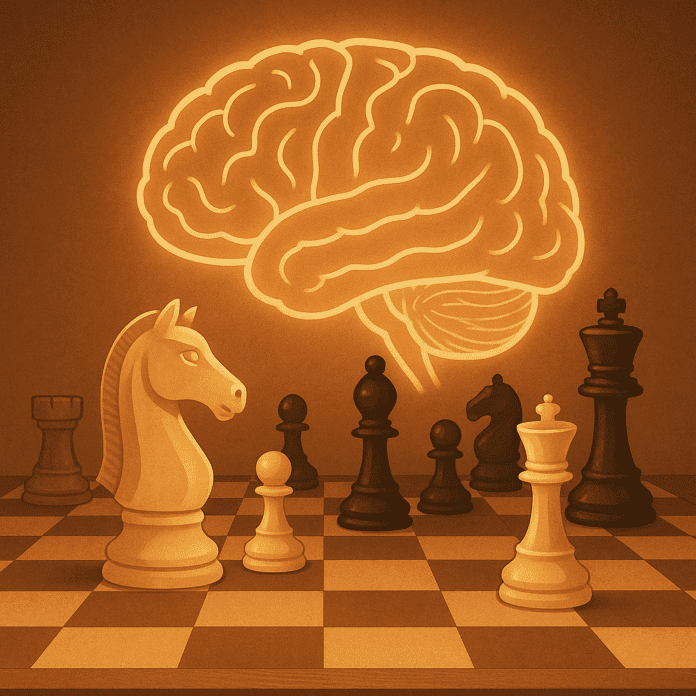How Playing Chess Can Improve Your Focus and Memory
Playing chess can improve your focus and memory if you regularly practice it, as this enhances your problem-solving skills and mental strength.
Studies have already begun to show a positive correlation between playing chess and high focus, memory retention, and brain health. Chess is an intricate dance of memory retention and logic structuring, paired with emotion regulation.
How Chess Improves Focus

Illustration of a person thinking while looking at a chessboard, with a brain graphic showing how chess improves focus.
Playing chess really helps you focus by requiring you to think critically and plan. This is a key to figuring out how to get better at chess. It also sharpens the focus when you put all your concentration into planning the strategy.
Helps You Stay Concentrated
All individuals familiar with chess are aware of its vast scope and the considerable time required to grasp it fully. One of the myriad realities of chess is that a single pawn can outwit and defeat a much more powerful Queen.
Is that a famous saying? Players need to concentrate and focus on all sides of the board to calculate the piece moves that will be favorable to them. Over time, with practice, this skill becomes a lot sharper.
Reports from students who undertook learning exercises in chess show that focus skills have shifted during the study sessions. Focused students were able to focus on deep-level activities while setting aside distractions.
Improves Decision-Making
Chess offers numerous options with every move. Players must evaluate the current situation, the possible answers, and the future objectives to be achieved. This leads to improved decision-making abilities, accompanied by mental fortitude.
Mental disorientation and excessive thinking happen under pressure. Playing chess exercises the mind, improves concentration, and boosts rapid-fire thinking. There are a couple of things above, besides gameplay, that relate to tests, work, and life activities, which are also pretty useful.
How Chess Strengthens Memory
 .
.
Boosts Working Memory
Working memory is the ability to hold and manipulate information for a short period of time. This is proven in chess. Players must think of several actions simultaneously, plan, and recall their previous game. This strengthens working memory.
Good working memory certainly aids in learning, reading, and problem-solving. Those who play chess tend to remember and follow instructions better. The ability to organize thoughts also improves whether you play chess online or at home.
Develops Pattern Recognition
Skilled players can recall and memorize thousands of positions on a chessboard. Their skill is reminiscent of their capacity for pattern recognition, the mental ability to identify and recognize shapes and arrangements. The brain anchors the information easily through the collective association of the chess moves.
It especially boosts long-term memory and learning. Recognition patterns are also helpful in map reading, puzzles, and facial recognition, as well as in various other contexts, including chess.
Why Chess Is Good for the Brain
Chess is an exciting game that requires a lot of thought, as players must think very carefully. While thinking that it is necessary to plan out every possible strategy, which could very well result in the killing of one of their players. Chess players must think very fast about the game. It is a perfect game, as it helps significantly with concentration and builds other skills that can be applied for various sports and games.
The Brain changes with consistent and intentional chess play, and not with the location of the game. Research using brain scans also demonstrates that frequent chess players have enhanced functional connectivity in the regions responsible for attention and memory. With time, this functional connectivity is proposed to sustain brain flexibility and sharpness.
Scientific Evidence About Chess and the Brain
There is a lot of research that backs up the idea that chess helps to develop certain functions of the brain. This is the reason why the IQ level of chess players and grandmasters is higher on average. A reason behind this trend is that professional chess players have better-developed neural networks associated with attention and memory.
Another study demonstrated that the integrated practice of chess with other strategies boosts students’ prefrontal activations, thereby enhancing focus and planning.
Due to its ability to maintain brain function and stave off cognitive decline, chess has measurable benefits for older adults. Regular chess players tend to experience improved mental acuity, easier concentration, and may exhibit a lower occurrence of Alzheimer’s disease.
Using Chess to Improve Focus and Memory
Chess is highly adaptable to many schedules and can be used for cognitive improvement in the following ways:
- Play a few times every week: Regular attention and memory training can be achieved within a few minutes of sessions, or micro-practices.
- “To learn, players should review their own games, as this enables them to conceptualize the various moves involved in chess.
- Conduct both types of tasks of varying lengths: performing long tasks fosters a sustained attention span, while completing multiple short tasks develops speed of thought and reaction.
- Mentally visualize the game of chess: this activity helps improve attention and working memory.
- Further mental and cognitive flexibility with integrated activities, for example, reading, doing puzzles, or playing other tactical games.
It is very much possible to utilize the game of chess to improve concentration and memory as long as one follows the steps provided above.”
Other Mental Benefits of Chess
The shift in focus and memory is not the only advantage. Accounting improves logic and imagination, which, in turn, improves emotionally controlled self-regulation. It teaches people to be in charge of themselves, regardless of the outcome, whether they win or lose.
Having greater self-control also stems from an improved ability to concentrate on various activities. It is a whenever-done game. The multifaceted skills of confidence, problem-solving, and mental exercise are part of the chess experience, applicable to both children and adults.
Myths and Limitations
The benefits of improved focus and memory from chess come only from constant and sustained practice. Casual players may not notice the changes and results that come from playing chess.
Moreover, chess strengthens specific mental skills, while it does not aid in learning languages or raising emotional intelligence, for example. Nevertheless, chess as part of a balanced routine can offer some of the best benefits for brain training.
Chess remains unparalleled in the level of mental activity it generates. It also does so in a delightful way. Complex patterns of attention, memory, and logical thought can be exercised while attempting to find solutions to the challenges posed during a chess game.
Enhanced concentration, improved mental retention, and increased mental prowess are achieved through regular play. The brain can be trained through chess at every stage of life, with children, adults, and even the elderly finding the game enjoyable.
FAQs
How does chess affect memory retention and recollection?
It enhances memory as players need to think of various moves/chess plays and develop different games, and as a result, improve their short and long-term memory.
Does it improve attention span in children?
Yes, children with more practice develop the ability to be patient, plan, and focus, skills which are often necessary in school.
What is the optimal rate of playing chess to note progress?
Improvement in concentration and recall is realized when playing chess 2 to 3 times a week for a duration of 30 to 60 minutes.
Are there any specific benefits of playing chess to the elderly?
Yes. It is useful in keeping the mind alert, which helps think clearly, avoiding loss of memory and declining mental ability.
